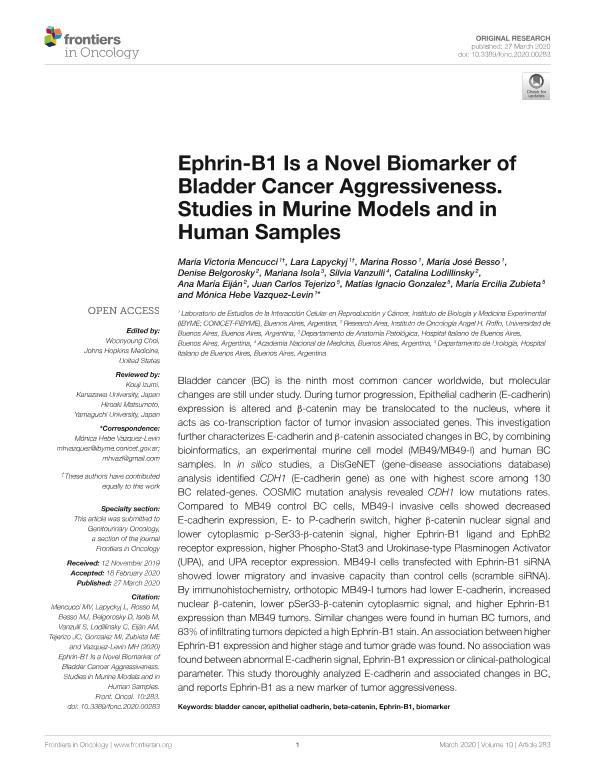Artículo
Ephrin-B1 Is a novel biomarker of bladder cancer aggressiveness. studies in murine models and in human samples
Mencucci, Maria Victoria ; Lapyckyj, Lara
; Lapyckyj, Lara ; Rosso, Marina
; Rosso, Marina ; Besso, María José
; Besso, María José ; Belgorosky, Denise
; Belgorosky, Denise ; Isola, Mariana; Vanzulli, Silvia; Lodillinsky, Catalina
; Isola, Mariana; Vanzulli, Silvia; Lodillinsky, Catalina ; Eiján, Ana María; Tejerizo, Juan Carlos; González, Matías Ignacio; Zubieta, María Ercilia; Vazquez, Monica Hebe
; Eiján, Ana María; Tejerizo, Juan Carlos; González, Matías Ignacio; Zubieta, María Ercilia; Vazquez, Monica Hebe
 ; Lapyckyj, Lara
; Lapyckyj, Lara ; Rosso, Marina
; Rosso, Marina ; Besso, María José
; Besso, María José ; Belgorosky, Denise
; Belgorosky, Denise ; Isola, Mariana; Vanzulli, Silvia; Lodillinsky, Catalina
; Isola, Mariana; Vanzulli, Silvia; Lodillinsky, Catalina ; Eiján, Ana María; Tejerizo, Juan Carlos; González, Matías Ignacio; Zubieta, María Ercilia; Vazquez, Monica Hebe
; Eiján, Ana María; Tejerizo, Juan Carlos; González, Matías Ignacio; Zubieta, María Ercilia; Vazquez, Monica Hebe
Fecha de publicación:
03/2020
Editorial:
Frontiers Media
Revista:
Frontiers in Oncology
e-ISSN:
2234-943X
Idioma:
Inglés
Tipo de recurso:
Artículo publicado
Clasificación temática:
Resumen
Bladder cancer (BC) is the ninth most common cancer worldwide, but molecular changes are still under study. During tumor progression, Epithelial cadherin (E-cadherin) expression is altered and β-catenin may be translocated to the nucleus, where it acts as co-transcription factor of tumor invasion associated genes. This investigation further characterizes E-cadherin and β-catenin associated changes in BC, by combining bioinformatics, an experimental murine cell model (MB49/MB49-I) and human BC samples. In in silico studies, a DisGeNET (gene-disease associations database) analysis identified CDH1 (E-cadherin gene) as one with highest score among 130 BC related-genes. COSMIC mutation analysis revealed CDH1 low mutations rates. Compared to MB49 control BC cells, MB49-I invasive cells showed decreased E-cadherin expression, E- to P-cadherin switch, higher β-catenin nuclear signal and lower cytoplasmic p-Ser33-β-catenin signal, higher Ephrin-B1 ligand and EphB2 receptor expression, higher Phospho-Stat3 and Urokinase-type Plasminogen Activator (UPA), and UPA receptor expression. MB49-I cells transfected with Ephrin-B1 siRNA showed lower migratory and invasive capacity than control cells (scramble siRNA). By immunohistochemistry, orthotopic MB49-I tumors had lower E-cadherin, increased nuclear β-catenin, lower pSer33-β-catenin cytoplasmic signal, and higher Ephrin-B1 expression than MB49 tumors. Similar changes were found in human BC tumors, and 83% of infiltrating tumors depicted a high Ephrin-B1 stain. An association between higher Ephrin-B1 expression and higher stage and tumor grade was found. No association was found between abnormal E-cadherin signal, Ephrin-B1 expression or clinical-pathological parameter. This study thoroughly analyzed E-cadherin and associated changes in BC, and reports Ephrin-B1 as a new marker of tumor aggressiveness.
Palabras clave:
BETA-CATENIN
,
BIOMARKER
,
BLADDER CANCER
,
EPHRIN-B1
,
EPITHELIAL CADHERIN
Archivos asociados
Licencia
Identificadores
Colecciones
Articulos(CENEXA)
Articulos de CENTRO DE ENDOCRINOLOGIA EXP.Y APLICADA (I)
Articulos de CENTRO DE ENDOCRINOLOGIA EXP.Y APLICADA (I)
Citación
Mencucci, Maria Victoria; Lapyckyj, Lara; Rosso, Marina; Besso, María José; Belgorosky, Denise; et al.; Ephrin-B1 Is a novel biomarker of bladder cancer aggressiveness. studies in murine models and in human samples; Frontiers Media; Frontiers in Oncology; 10; 3-2020; -
Compartir
Altmétricas



